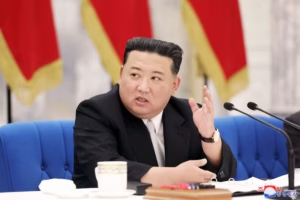Already a subscriber? Make sure to log into your account before viewing this content. You can access your account by hitting the “login” button on the top right corner. Still unable to see the content after signing in? Make sure your card on file is up-to-date.
The Pentagon has once again extended the deployment of the USS Harry S. Truman in the Middle East as part of an ongoing effort to escalate US military pressure on the Houthi rebels in Yemen.
Some shit you should know before you read: Just to give you some quick background, the Houthis are an Iran-backed militant group based in Yemen that has launched missile and drone attacks on commercial vessels, including those with no direct ties to Israel, severely disrupting global shipping. As a result, maritime traffic through the Red Sea—a route that typically handles about 12% of global trade—has plummeted by 55%, pissing off countries like Egypt (which controls the Suez Canal) and forcing many shipping companies to reroute around Africa. In response, President Donald Trump recently intensified US military operations against the Houthis under Operation Rough Rider, which has involved daily airstrikes targeting missile sites, drone launch areas, radar installations, and weapons depots across Yemen. The Houthis say they are targeting ships linked to Israel or Israeli interests as part of their campaign to pressure an end to the war in Gaza. The US has also issued warnings to Iran, accusing it of supplying the Houthis with advanced weaponry.

What’s going on now: First reported by AP, the Pentagon approved an extension of the USS Harry S. Truman mission in the Middle East, a decision authorized by Defense Secretary Pete Hegseth following a request from Gen. Erik Kurilla, head of US Central Command. The move is intended to keep both the Truman and the USS Carl Vinson active in the region in response to escalating threats from Yemen’s Houthi rebels. Originally scheduled to return to its homeport in Norfolk, Virginia, the Truman will now continue supporting US operations as the military intensifies its campaign against the Iran-backed group.
The extension comes as the Houthis have ramped up both the frequency and scope of their attacks, claiming responsibility for a series of drone strikes targeting the USS Carl Vinson and the USS Truman. Houthi officials allege they successfully hit the Truman with drones, forced it to retreat toward the Suez Canal, and even downed a US F-18 fighter jet during a disrupted aerial assault.

That said, many of these bold claims often lack verification and are widely dismissed as exaggerations aimed at shaping public perception. Despite this, they have succeeded in shooting down multiple US MQ-9 Reaper drones over Yemen. According to a CENTCOM statement, the Houthis have downed at least seven MQ-9 drones in the last eight weeks. Each MQ-9 costs approximately $30 million.







